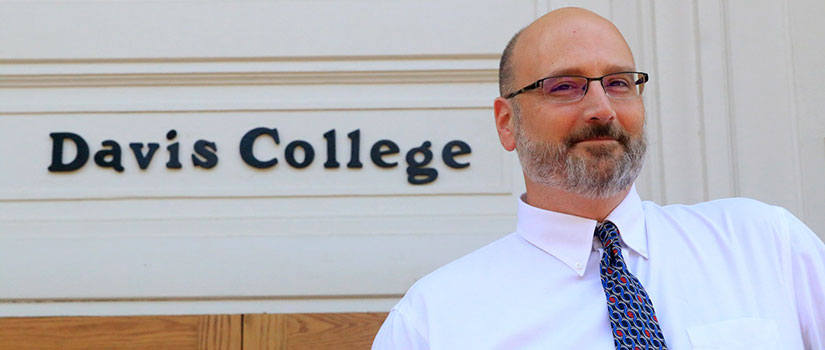Published December 19, 2016
Story and Photo by Haley Helson, Reprinted from InterCom
Top Image: Dr. David Lankes is the director of the School of Library and Information
Science.
What are "Geeks with Social Skills" and why do we want them?
Dr. David Lankes, director of the School of Library and Information Science (SLIS), can explain. As the school revamps its undergraduate bachelor’s degree in information science (BSIS), Dr. Lankes is looking to recruit what he calls “passionate people who are really excited about what technology can do.”
The term “geek” has evolved from a connotation that used to elicit a distasteful response. But as technology advances, geekdom is, well, no longer geeky.
The “social skills” aspect of the term incorporates how people who understand technology can successfully communicate it to the public.
“This is building on the popular new definition of someone who is really enthusiastic about an issue,” he said.
What sets these geeks apart? They love to make connections with people and provide them with the information they need, based on systems and evolving technology. The geeks embrace the ever-changing world and understand that communication is key when solving problems.
SLIS is seeking to attract and prepare professionals who want to use their knowledge of technology and apply it to help the community. It could be a business trying to gure out how to get to a market faster, a newspaper trying to migrate from print to digital or a number of problems encompassing every aspect of how technology and community work in unison.
Another innovative way of incorporating technology and community is what libraries are doing with makerspaces. These are DIY areas where people can come together to create, learn and invent. Dr. Lankes sees this as a progressive opportunity to integrate the creative aspect into the SLIS curriculum.
“We’ve always been makers,” said Lankes, “But the movement came as technology became cheaper and smaller, (and) tools for manufacturing became more accessible to more people.”
Jennifer Tazerouti, a SLIS alumna and now a librarian in Spartanburg, explains that makerspaces prepare children and students for the future by giving them the technology they need so badly.
The School has a great tradition of seeing important problems and wehre information science plays a role in improving society by addressing them.
Dr. David Lankes
“Makerspaces can provide students with an expanded selection of materials to utilize to express their learning. Makerspaces also offer opportunities for self-directed learning and exploration. Students can often use makerspaces to work on school projects together, fostering collaborative skill building,” says Tazerouti.
Dr. Lankes says that these spaces of creativity combine manufacturing equipment, technology and education to inspire members of the community to do just that. Create. Makerspaces are fairly new, but they are creating an enormous impact on the community as they are integrated into schools and libraries across the country.
The School of Library and Information Science has made an impact across the region. But Dr. Lankes believes that the next step is to take SLIS to a national level.
In his first year as director, Dr. Lankes hopes the school can make a national mark in its 50th. He’s counting creatively from when the school was authorized, a couple of years before its first graduates.
The school has a great tradition of seeing important problems and where information science plays a role in improving society by addressing those problems, said Dr. Lankes. "Where we’re going is to have that impact be noted and expanded nationwide.”
The mission might be broad and challenging. But the statement, written in bold on Dr. Lankes’ whiteboard is “to coordinate the knowledge infrastructure to speed learning and improve decision making within a community.”
